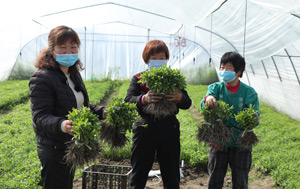As a leading global stevia supplier, in 2019 Tate & Lyle commissioned Earthwatch to undertake a first-of-its-kind study to assess the environmental impacts of different approaches to stevia production in China, where most of the world’s stevia is grown. The study identified a significant opportunity to drive environmental improvements in stevia production and support the Company’s suppliers in Dongtai, one of the first areas in China where stevia was cultivated around 40 years ago and one of the main seedling supply areas in the country. Learnings from this study have been incorporated into the new sustainable stevia programme, with key areas identified by Earthwatch including:
- Lowering the environmental impacts of stevia production by changing usage of synthetic fertiliser and pesticides to more sustainable alternatives, and providing guidance on application timing, targeting and volumes.
- Taking a comprehensive prevention and control approach to protect against pests, crop diseases and weeds, replacing plastic materials used for mulching with more sustainable alternatives.
- Developing farming practices to help maintain soil health, keep carbon locked in and improve on-farm composting.
Stevia experts from nearby NJAU are supporting growers in the programme through training, farm visits and best practice sharing. In a new pilot study, the NJAU team will also apply more sustainable fertiliser to an area of land and monitor its impact to help demonstrate and communicate the benefits of this intervention, the main recommendation for Dongtai farmers in the 2019 study. Stevia growers will also benefit from mentoring throughout the programme using the Sustainable Agriculture Initiative Platform’s (SAI Platform) Farm Sustainability Assessment (FSA), which assesses the continuous improvement of agricultural practices.
Nick Hampton, Chief Executive of Tate & Lyle, said: “We are excited to announce our new programme with Earthwatch Europe and Nanjing Agricultural University, which will help farming families in China secure a more sustainable future while enabling our customers to offer consumers sustainably-sourced, plant-based sweeteners. Through this initiative we are living our purpose of Improving Lives for Generations by supporting healthy living, building thriving communities and caring for our planet by improving stevia’s environmental footprint.”
Maria Pontes, Director of Programmes & Partnerships at Earthwatch Europe, said: “We’re excited to be continuing our work with Tate & Lyle to support the implementation of recommendations from our 2019 study into the environmental sustainability of growing stevia. This partnership helps to connect businesses with the suppliers in their supply chain, and through our expertise in citizen science, and relationship with Nanjing Agricultural University, we aim to support the stevia farmers’ transition to a more environmentally sustainable way of farming.”
Professor Luo Qingyun of Nanjing Agricultural University said: “I was pleased to be asked by Tate & Lyle and Earthwatch Europe to conduct a field study on the stevia planting to help promote the sustainable development of this sector in my country. Our findings emphasised the need to help growers move to a more sustainable approach. This new programme integrates research and development, with the education and promotion of sustainable practices into the stevia supply chain and will help growers to support a more sustainable farming model, benefiting from production scale and a less labour-dependent approach.”
ENDS
Notes to editors:
- Sustainable Agriculture Initiative Platform (SAI Platform) is a food and drink industry platform that develops sustainable agriculture solutions through member-driven collaboration.
- This pilot programme will run until 2022.
Media contacts for further information:
Tate & Lyle PLC: anna.taylor-elphick@tateandlyle.com / +44(0)7766361515
Earthwatch Europe: pressoffice@earthwatch.org.uk
